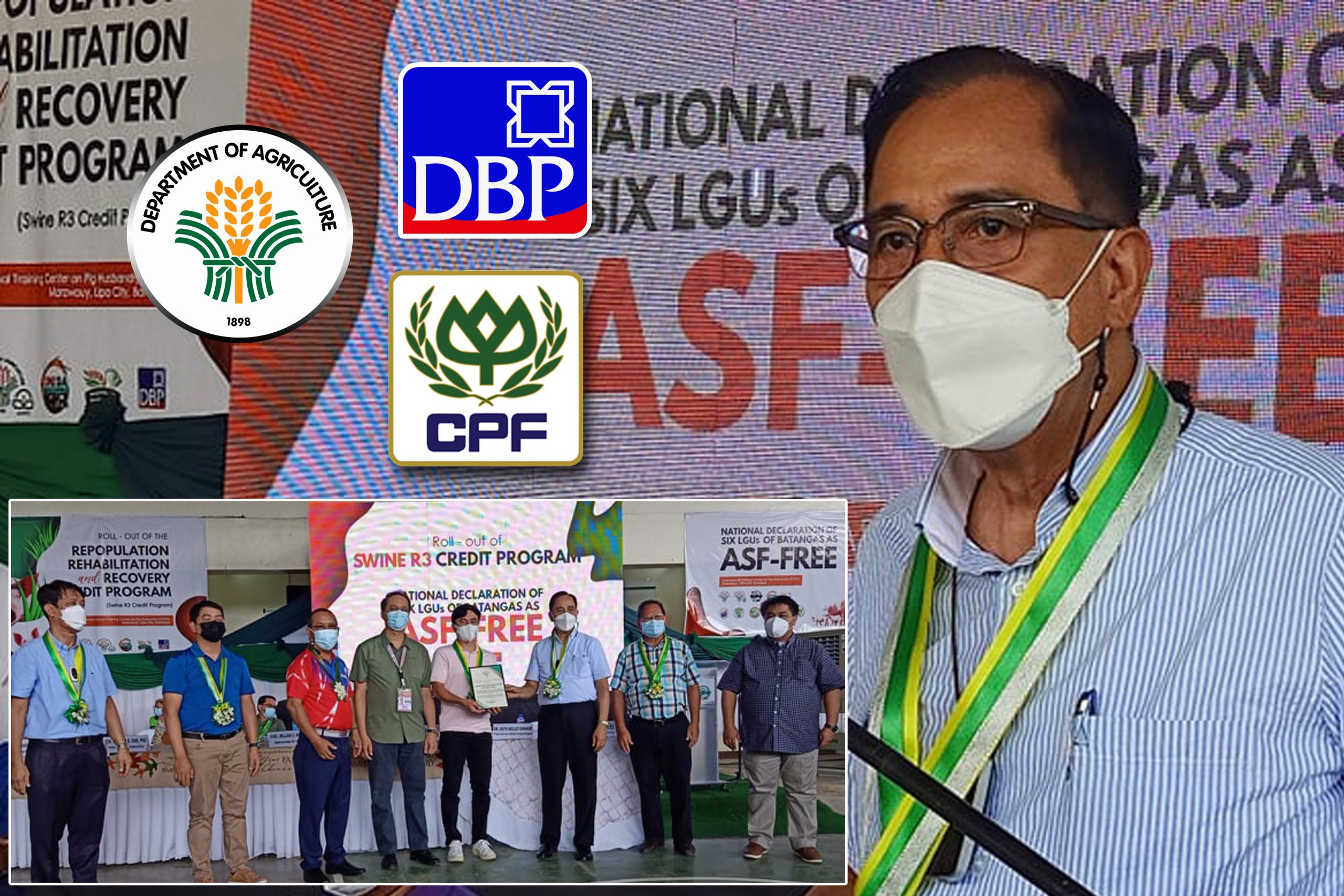
Backyard and commercial hog raisers in Batangas Province, which was the first to declare areas that recovered from African Swine Fever (ASF), can now avail of the Swine Rehabilitation, Repopulation and Recovery Credit (Swine R3) program.
The Department of Agriculture (DA), Development Bank of the Philippines (DBP), and the Thailand-based agro-industrial and food conglomerate, Charoen Pokphand Foods Philippines Corporation (CP Foods) jointly rolled-out the new program in Lipa City, Batangas on July 8, 2021.
“Local hog repopulation will lead the way in bringing back the industry, because they have been badly battered in these almost two years of our fight against ASF. Gusto ko ulit banggitin na ang Kagawaran ng Pagsasaka ay numero unong binibigyan ng suporta ang local hog industry,” Agriculture Secretary William Dar said as he introduced the readily available financial and credit facilities for hog raisers to bounce back from ASF.
The Swine R3 program was developed by the DBP and CP Foods to support and elevate the national government’s effort in reviving the local hog industry, particularly for the implementation of DA’s Integrated National Swine Production Initiatives for Recovery and Expansion (INSPIRE).
“In support of the DA’s INSPIRE program, the DBP launched the Swine R3 program to provide assistance to eligible public and private institutions in the establishment of biosecured farm facilities,” DBP Assistant Vice President Rallen Verdadero said.
Swine R3 specifically aims to provide financing support to the local swine industry in responding to the country’s food requirements, finance the promotion of agribusiness for countryside development, and provide the facility for the agri-agra projects in compliance to the Agri-Agra Reform Credit Act.
According to Verdadero, the program has two lending schemes: 1) for medium- and large-scale enterprises to be handled by regular bank funds, and 2) for smallscale enterprises with P500 million funding from DA to provide loans with zero interest.
“Dahil na-declare na kayo na ASF-free, we encourage all of you especially the backyard, semi-commercial and commercial hog raisers to now go back to swine farming or even expand your operation lalo na yung hindi tinamaan,” DA Undersecretary for Livestock Dr. William Medrano said.
He added that they can avail of the various financial and credit programs offered by the DA through the Agricultural Credit Policy Council (ACPC) and Philippine Crop Insurance Corporation) and in partnership with DBP and the Land Bank of the Philippines. Private sector partners such as CP Foods also committed to providing technical support and marketing assistance.
CP Foods General Manager Darwin Lictawa presented their company’s business models for swine projects that involve the collaboration among farmers/growers, financing institutions like the DBP, and the CP Foods.
Under their contract farming projects, he said that farmers can earn at least P1,050 per pig in one cycle or have a gross annual income of P3 million in one farm/building with 1,300 heads depending on the quality of their production.
“We are proud to say that since our operation in 2011 at magmula po ng pumasok ang ASF sa Pilipinas, sa lahat po ng partners namin at growers, wala pong tinamaan ng ASF. Dahil po sa sistema sa biosecurity at dahil sa technologies na ibinibigay at itinuturo namin sa mga partners namin,” Lictawa said.
Currently, CP Foods has 10 breeder farms and 150 buildings of contract farms or fattening farms located in different parts of the country.
The Swine R3 program was also launched in the provinces of Tarlac and Isabela on May 6, 2021 and June 10, 2021, respectively.
“With all these available, we hope that we will be able to boost your confidence to go back to swine farming and reinvest in swine farming and the DA under the dynamic leadership of Secretary Dar ay nandito lamang po kami, nakahandang tumulong,” Undersecretary Medrano said. ### (Gumamela Celes Bejarin, DA-AFID)















